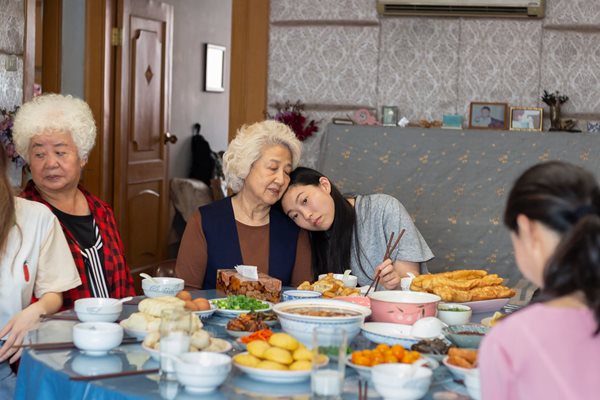This empathic comedy-drama centers on a large, intergenerational family with roots in China, although many of its members have relocated to either America or Japan. They are brought together for a fateful few days in the northern city of Changchun, where they have come to see the family matriarch, Nai Nai (Shuzhen Zhao), who has recently been diagnosed with terminal lung cancer. The twist: Nai Nai doesn’t know about the severity of the illness; she thinks the visits are for a last-minute wedding.
Nai Nai and her only granddaughter, Billi (Awkwafina), are close despite the latter having grown up in the States. One of the earliest scenes is a phone call in which the grandmother warns Billi, who lives in New York City, to watch out for earring thieves, which is advice Billi listens to tacitly. From the get-go, we can tell that these are very different people. Along with speaking far less crisp Chinese compared to Nai Nai, Billi immediately pals up to a stranger, which we assume her grandmother would not approve of.
Billi is devastated to hear about her grandmother’s diagnosis and then horrified to find out her family’s plan to conceal the truth. Her mother, Jian (Diana Lin), who is Nai Nai’s daughter-in-law, responds that the Chinese have an old saying: people who get lung cancer die. It sounds like a joke at first, but her point is that diseases aren’t what kill; rather, it’s the anxiety and fear that comes with knowing about them. Based on the culture Jian grew up in, this is a “good lie.” Its intention is to be merciful, but the concept of the “good lie” proves easier to explain than to adhere to.
Writer-director Lulu Wang milks the subsequent awkwardness for dry humor. Since the prospective groom is Nai Nai’s only grandson, she insists on throwing the most elaborate bash possible, which requires planning and is exactly the opposite of what her family would prefer. Rather than take it easy, she gets in situations that agitate her, which puts her visitors on pins and needles. When Nai Nai disappears without warning one morning, everyone loses their minds.
Based on Billi’s initial reaction to “the good lie,” we assume the film falls on the side of somebody eventually telling Nai Nai the truth. Wang, however, takes a more complex view, suggesting that how one feels about families telling the truth—whether they must be forthright with one another at all times—depends on the culture they have been immersed in. For those of Nai Nai’s generation who have lived in China all of their lives, there are no qualms about what they’re doing. But it’s slightly different for Billi’s father, Haiyan (Tzi Ma), and her uncle, who for decades have lived in America and Japan, respectively. At various points, they seem on the precipice of breaking from the others, and Haiyan mentions that back home, what they are doing to Nai Nai would be illegal.
Meanwhile, Billi’s arc becomes less about judging the others—or even saying goodbye to her beloved grandmother—than coming to terms with her experience as a Chinese-American, which might be similar for many emigrants. She has spent so much of her life far from her country of origin, separated from much of her extended family. Her father and his brother went through something similar, but at least Billi has her parents. For the two now-grown-up men, the visit becomes a reckoning with the past as they are reminded of all the years they were not around for Nai Nai.
Billi and Jian also try to accept how their respective relationships with Nai Nai have turned out—the good and the bad. We observe that history has tended to repeat itself. While Billi’s mother does not hesitate to nag her daughter about how she lives her life, we find out that Nai Nai did the same years before. Yet when it comes to Billi and her grandmother, they each seem quite fascinated by the other. (The actors, it should be noted, share a warm chemistry).
A film about any large, extended family would not be complete without intra-family politics. At one point, an in-law starts needling Billi’s parents about whether they raised their daughter properly because she has pursued a writing career instead of trying to become a millionaire. Wang never takes a clear side in the argument of whether American self-fulfillment is superior to the Chinese pursuit of wealth and glory—or whether life in America is better than in China, for that matter—but we have an idea of how Billi’s life as an artist has had both pros and cons for her.
Overall, this entertaining film offers good performances all around, but I do question the basic premise of the wedding. As devices go, it allows the groom, Haohao (Han Chen), to seem appropriately ambivalent, but it’s unclear whether he and his fiancée had intended to get married anyway, in which case his nuptials now have a dark cloud over them, or whether the family coerced him into getting married. Without knowing that, it is difficult to gauge how much sympathy to have for him.
Wang also includes a last-minute coda that allows for a happy ending, but it drains some of the film’s poignancy. Nevertheless, The Farewell does an excellent job balancing scenes of sadness and joy, and audiences are likely to find something to appreciate in how this family relates across generations.







Leave A Comment